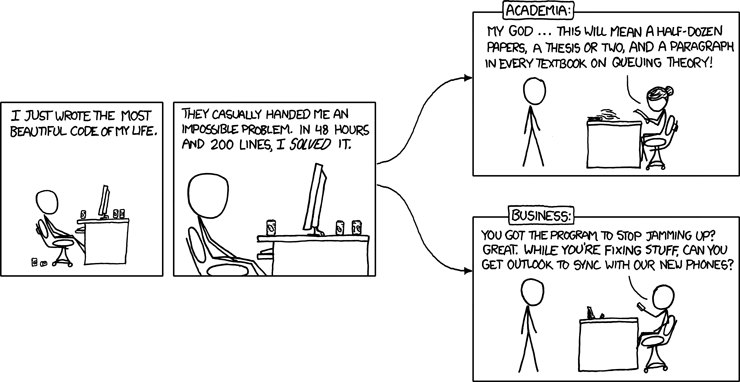664: Academia vs. Business
| Academia vs. Business |
 Title text: Some engineer out there has solved P=NP and it's locked up in an electric eggbeater calibration routine. For every 0x5f375a86 we learn about, there are thousands we never see. |
Explanation
The problem in the comic is finding the fast inverse square root, as mentioned in the title text.
After solving the problem, the comic splits into two alternate timelines. Showing the brilliant computer code he'd written to somebody who actually knows computer code allows the academician to see the programmer's true brilliance and get him much-earned plaudits from the academic community.
But in the other alternate timeline (implied to be what actually happens), the boss, not possessing that knowledge, simply sees the results, and not the means Cueball used to attain them. He then gives Cueball another assignment. This, sadly, is Truth in Television, as the private sector seems to only care about your results, not how you came about them.
Transcript
- [Cueball sits at a desk in front of a computer. There are cans on the desk and more crushed ones on the floor.]
- Cueball: I just wrote the most beautiful code of my life.
- Cueball: They casually handed me an impossible problem. In 48 hours and 200 lines, I SOLVED it.
- [Lines divide the comic into two possible end panels here, labeled "Academia" and "Business."]
- [Academia]
- Professor: My god ... this will mean a half-dozen papers, a thesis or two, and a paragraph in every textbook on queueing theory!
- [Business]
- Boss: You got the program to stop jamming up? Great. While you're fixing stuff, can you get Outlook to sync with our new phones?
Discussion
I'm not convinced the problem solved in the comic panels is the fast inverse square root in the title text, as the academia panel implies that it impacts queuing theory, and I'm not sure what fast inv sqrt has to do with queuing theory. -- 204.89.186.1 (talk) (please sign your comments with ~~~~)
- Agreed. Fast inv sqrt is clearly referenced in the title text, but the problem in the comic is something else. Alpha (talk) 01:18, 2 March 2013 (UTC)
If this ever happened to me, I would quietly release the solution under the GNU license. My getting fired (possibly) is totally worth the public technological progress highly into the future. Greyson (talk) 13:29, 14 March 2013 (UTC)
The explanation is an interesting contrast to my interpretation. The meaning I got was that in academia, this discovery, like any new discovery, is interesting; but in business, this discovery has little practical application (apart from finishing what he was doing) so his boss didn't think twice about it. Maybe I'm too cynical.--18.215.1.155 01:23, 13 May 2013 (UTC)
- Weird, my interpretation was different from both the one in the explanation and this one: Academia is too focused on authoring papers and making a name for oneself and therefore makes a much bigger deal about problem-solving than business, where solving difficult problems is just a regular part of the job. Which interpretation is correct? It likely depends on one's viewpoint! Ianrbibtitlht (talk) 03:00, 18 June 2019 (UTC)
Seeing the presence of cans... possibly alcoholic. Might it be possible that the Ballmer Peak was successfully invoked to reach his solution? 108.162.219.96 15:46, 1 December 2016 (UTC)
- They look too small: this, plus the 48-hour time-frame, suggests to me that they're energy drinks. L-Space Traveler (talk) 19:37, 23 October 2022 (UTC)
Derailing the topic entirely, the old woman in the "Academia" panel seems to be a somewhat recurring character, complete with a semi-consistent personality. I propose "Bunhead" for future references. Anonymous17:39, 4 December 2013 (UTC)
- I counter-propose 'MsBun'. 108.162.219.223 00:49, 7 January 2014 (UTC)
Oh, my goodness, "TruthInTelevision"? This isn't TvTropes!108.162.237.120 20:53, 19 January 2014 (UTC)
Can anyone remember an episode of Click (or any BBC computer programme) ever giving such in depth explanation of the graphics problem? I recall one showing the difference in game presentations then and "now" from around about the time the article claims information hit the mainstream but it was no more than 'advertising without naming names' a la Beeb.Weatherlawyer (talk) 07:59, 4 January 2015 (UTC)
There was a recent paper claiming to have solved P!=NP
I believe that the title text refers to a famous quote by Stephen Jay Gould: “I am, somehow, less interested in the weight and convolutions of Einstein’s brain than in the near certainty that people of equal talent have lived and died in cotton fields and sweatshops.” — it's not a 100% match but I think that was what he was going for. It certainly fits the concept that capitalism and business eat up the intellect of great people and leave nothing to show for it, in contract to the purity of science/academia. I will edit in a comment to that effect. AmbroseChapel (talk) 01:28, 21 September 2017 (UTC)
- The big difference is, that the people from your quote were truly wasted talents, as they were doing mere manual labor. Meanwhile the title text talks about talents that are used, but never became popular.--Lupo (talk) 14:35, 17 October 2018 (UTC)
- How is that difference meaningful? The point is that if some talent wasn't brought out to shine at its brightest, it was lost. What else exactly was done with it doesn't matter.172.70.250.67 23:01, 29 July 2022 (UTC)
Where does Gould specify that originally in that quote he was referring to racism and not capitalism?
172.70.250.67 23:01, 29 July 2022 (UTC)